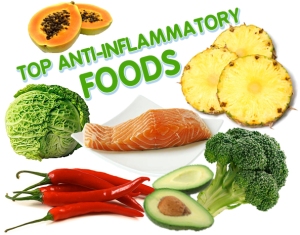The information on inflammation: science on the anti-inflammatory diet
This is a re-post from the blog Is It Healthful? It’s a blog by a personal trainer with degrees in Exercise Science and Physiotherapy, check it out to get some good scientific summaries of trends in health and wellness.
Bitumen on a sweaty, sultry summer’s day. Doesn’t get much hotter, right? Wrong! Right now the anti-inflammatory diet is hotter than Hades. Heck, it’s hotter than Hansel, who as you know, is so hot right know. As the anti-inflammatory diet’s popularity reaches fever pitch, we ask ourselves is this just another fad diet, or is it the answer to all the our problems?
Why?
Before I even answer that question, why should you even consider consuming an anti-inflammatory diet? Well, inflammation in one way or another, has been found to be consistently associated with nearly every single chronic disease. However, just because something is associated with something else doesn’t mean it is definitely the cause. But it is a cause for concern! So, that brings us to the age old question, does it work?
Cardiovascular health:
The Mediterranean diet, which is remarkably similar to the anti-inflammatory diet, has been demonstrated to decrease the risk of heart attack and other major cardiovascular complications by 30%. Also, unsurprisingly, it improves markers of cardiovascular health such as blood pressure (1). Promising signs!
A review paper of multiple studies found that the nutrients promoted in the anti-inflammatory diet are consistent with those that have improved outcomes in patients with peripheral artery disease, another cardiovascular condition. Also, the anti-inflammatory diet does not contain the nutrients that are harmful to this condition (2). You beauty! So, while we can’t directly prove that the anti-inflammatory diet is effective in improving cardiovascular health the results look very promising – even sexy, some might say!
Inflammatory bowel disease (Crohn’s disease and ulcerative colitis):
A hallmark of inflammatory bowel disease is…. you guessed it, inflammation. So you’d think an anti-inflammatory diet would probably work. And it appears it does. A study found that 100% of individuals suffering from inflammatory bowel disease who followed the anti-inflammatory diet decreased medication use after following the anti-inflammatory diet. All 100% also had a reduction in symptoms (3). Similarly, in another study on Crohn’s disease patients, the anti-inflammatory diet improved markers of inflammation. Shocking, I know. (4). So again, it looks really, really promising but there isn’t the stone cold science there just yet to make us 100% confident in this diet’s effects.
Musculoskeletal health:
What about musculoskeletal problems – back pain, neck pain, broken bones? Funny you should ask. In a group of patients with low back pain, supplementation with fish oil tablets was compared to taking anti-inflammatory drugs (Voltaren, neurofen, etc.). It was found that fish oil supplementation was as effective as taking anti-inflammatory drugs for decreasing back pain (5). While fish oil tablets aren’t the same as consuming an anti-inflammatory diet, they provide one of the key nutrients of the anti-inflammatory diet: omega-3 fatty acids. Good stuff.
Somewhat similarly, in a group of patients with rheumatoid arthritis, consuming an anti-inflammatory diet decreased pain and symptoms compared to consuming a normal western diet. It also augmented the effects of consuming fish oil tablets (6). Good again.
Last, but most certainly not least, consuming an anti-inflammatory diet decreased inflammation in ankylosing spondylitis patients and reduced the number of flare ups and time to flare up for this condition. Ankylosing spondylitis is an autoimmune disorder where the spine stiffens – prolonged systemic inflammation is present in this condition (7). So, all in all, the anti-inflammatory diet looks good at managing chronic musculoskeletal complaints where inflammation is present.
Is it healthful?
For inflammatory gastrointestinal issues, chronic musculoskeletal conditions and cardiovascular health it looks like the anti-inflammatory diet helps. There has not yet been enough good quality research to 100% confirm this, but if you look below, it’s an extremely healthy diet which ain’t going to do any harm. Give it a try!
Our verdict: Slightly healthful. Likely to be proven moderately to very healthful with further research.
What to eat if you’re going anti-inflammatory?
1. Eat plenty of fruits and vegetables.
2. Eat good sources of omega-3 fatty acids, such as fish or fish oil supplements and walnuts.
3. Eat plenty of whole grains such as brown rice and bulgur wheat (see this link, to determine whether its a wholegrain or not – packaging can be misleading).
4. Eat lean protein sources such as chicken; cut back on red meat and full-fat dairy foods.
5. Minimize saturated and trans fats. Except maybe a spoon of coconut oil daily!
6. Avoid refined foods and processed foods.
7. Consume alcohol and caffeine in moderation
8. Eat a variety of spices, especially ginger and curry.
I hope this has been healthful.





